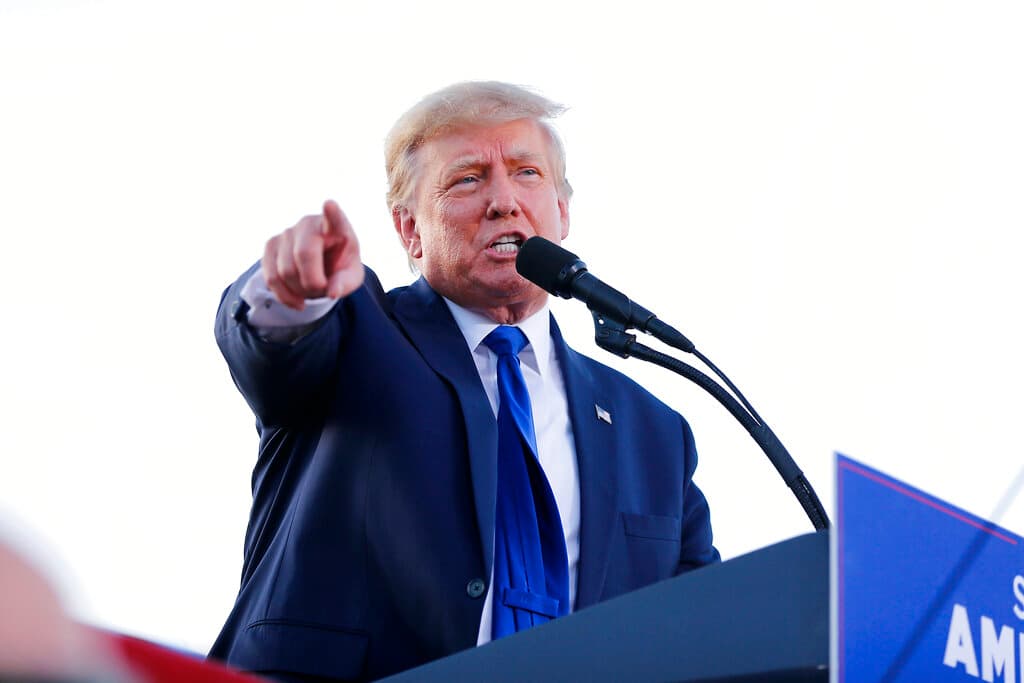Trump Ruled in Contempt of Court in New York Case
With the court ruling against him today, Trump is already on the hook for $250,000 in fines. President Clinton was the first chief executive ruled in contempt of court.

President Trump today became the second president to be held in contempt of court, in a case related to his refusal to turn over financial documents to an investigation led by New York’s attorney general, Letitia James.
She argued that Mr. Trump’s refusal to comply with a subpoena qualifies as contempt of court, a term that Cornell University defines simply as “disobedience of an order of a court” or “conduct tending to obstruct or interfere with the orderly administration of justice.”
Mr. Trump will be fined $10,000 for every day that he fails to comply with a subpoena that required him to provide financial documents, going back to March 31.
With the court ruling against him today, Mr. Trump is already on the hook for $250,000 in fines. President Clinton was the first chief executive ruled in contempt of court.
Today’s hearing is only the latest twist in a civil case brought by the state against Mr. Trump over the alleged falsification of information in financial documents relating to his company’s properties.
“Rather than ‘comply in full,’ with the Court’s unambiguous directive by producing all responsive documents by March 31,” the motion filed by Ms. James’s office at the state supreme court notes, “Mr. Trump did not comply at all.”
In a statement, the attorney general added: “The judge’s order was crystal clear: Donald J. Trump must comply with our subpoena and turn over relevant documents to my office…. Instead of obeying a court order, Mr. Trump is trying to evade it. We are seeking the court’s immediate intervention because no one is above the law.”
Ms. James is pursuing documents from Mr. Trump and his organization relating to alleged “fraudulent and misleading” valuations of properties, supposedly for the purposes of acquiring favorable loans and tax benefits. The fines are meant to coerce Mr. Trump into providing the documents.
The investigation has already seen delays. The initial deadline to comply with the subpoena was March 3. This was then extended to March 31. Ms. James argued that the subpoena’s extension was not an extension of negotiations.
“This Court’s order was not an opening bid for a negotiation or an invitation for a new round of challenges to the subpoena,” her motion reads.
Following the extension, Mr. Trump filed a lawsuit in an unsuccessful attempt to stop the investigation altogether. He argued that the civil investigation could help to incriminate him in a separate criminal investigation by the Manhattan district attorney, Alvin Bragg.
“Her mission is guided solely by political animus and a desire to harass, intimidate, and retaliate against a private citizen who she views as a political opponent,” Mr. Trump’s lawsuit reads.
A New York supreme court judge, Arthur Engoron, rejected Mr. Trump’s claims, ordering him to comply with the subpoena.
“In the final analysis, a State Attorney General commences investigating a business entity, uncovers copious evidence of possible financial fraud, and wants to question, under oath, several of the entities’ principals, including its namesake. She has the clear right to do so,” Judge Engoran said.
One of Mr. Trump’s lawyers, Alina Habba, has since contested the characterization of Mr. Trump’s actions as being in contempt of court, arguing that it is his company that would be responsible for providing documents.
“After conducting a diligent search and review, Respondent’s counsel determined that Respondent was not in possession of any documents responsive to the Subpoena and that all potentially responsive documents were in the possession, custody or control of the Trump Organization,” Ms. Habba wrote.
She has also stated that she believes the investigation and motion to hold Mr. Trump in contempt of court is “little more than a contrived publicity stunt.”
The New York attorney general’s office characterized Mr. Trump’s response as an intentional delay, meant to confuse the investigation.
“Mr. Trump’s purported ‘Response’ violates the Court’s order; it is not full compliance, or any degree of compliance, but simply more delay and obfuscation,” Ms. James’s office wrote.
While Ms. James does have some history of antagonistic rhetoric against Mr. Trump spanning back to her 2018 electoral victory, the court has found her investigation to be legitimate and warranted so far.
While nothing has been proved in court, perhaps in part due to Mr. Trump or his organization’s failure to provide documentation, questions have arisen over whether Mr. Trump misreported property values.
Mr. Trump’s former accounting agency, Mazars USA LLP, has indicated that some of the documents that it prepared for Mr. Trump may not be accurate.
“While we have not concluded that the various financial statements, as a whole, contain material discrepancies, based upon the totality of the circumstances, we believe our advice to you to no longer rely upon those financial statements is appropriate,” the Mazars USA general counsel, William J. Kelly, wrote to the Trump Organization.
Mr. Trump’s company has refuted this notion, saying that “such statements of financial condition do not contain any material discrepancies.”

